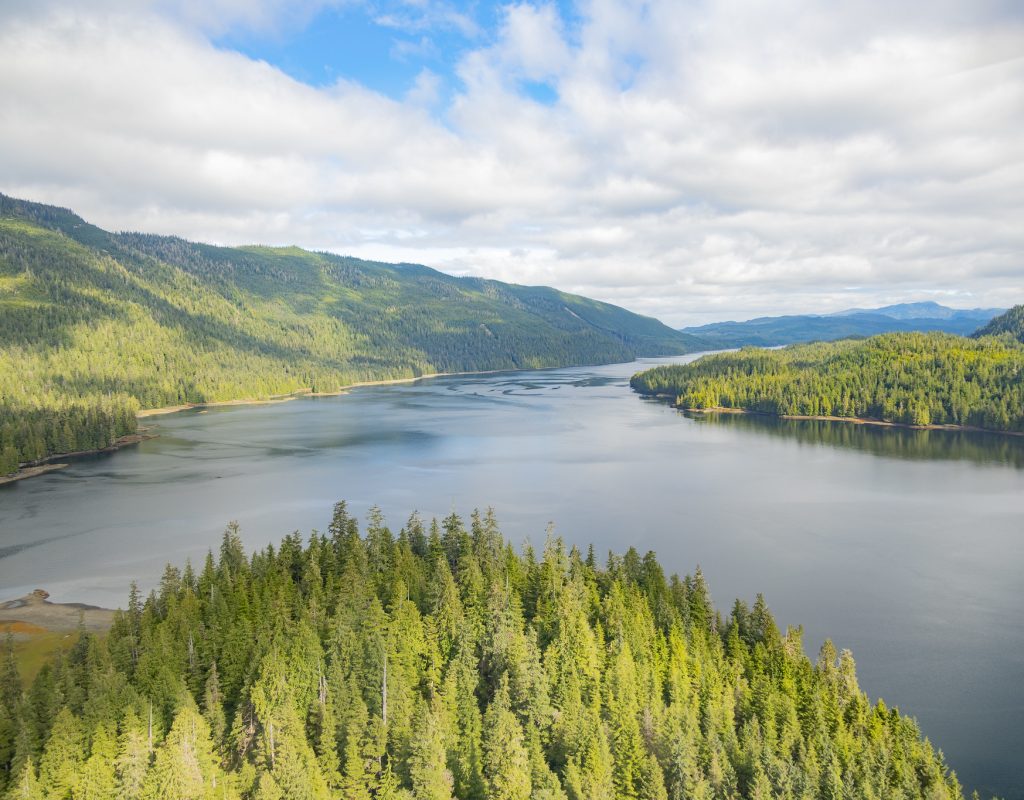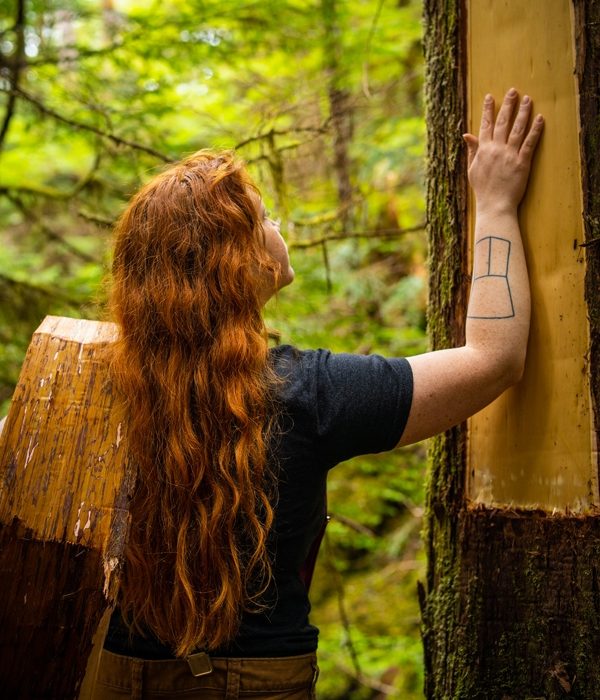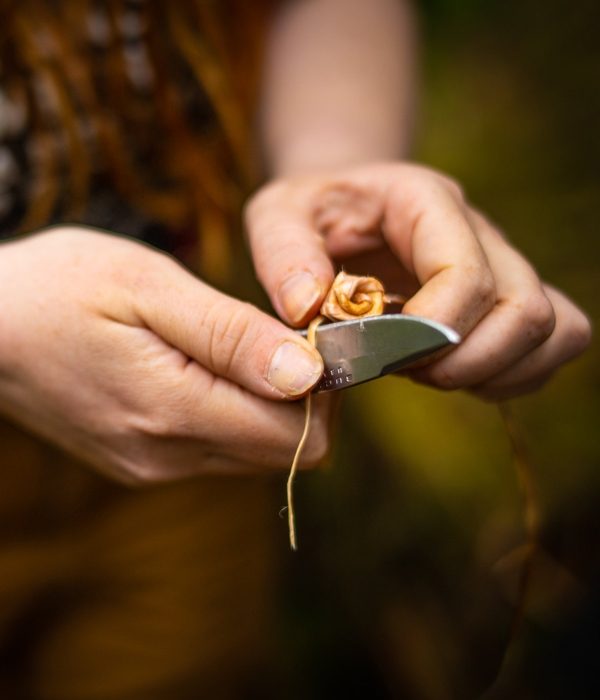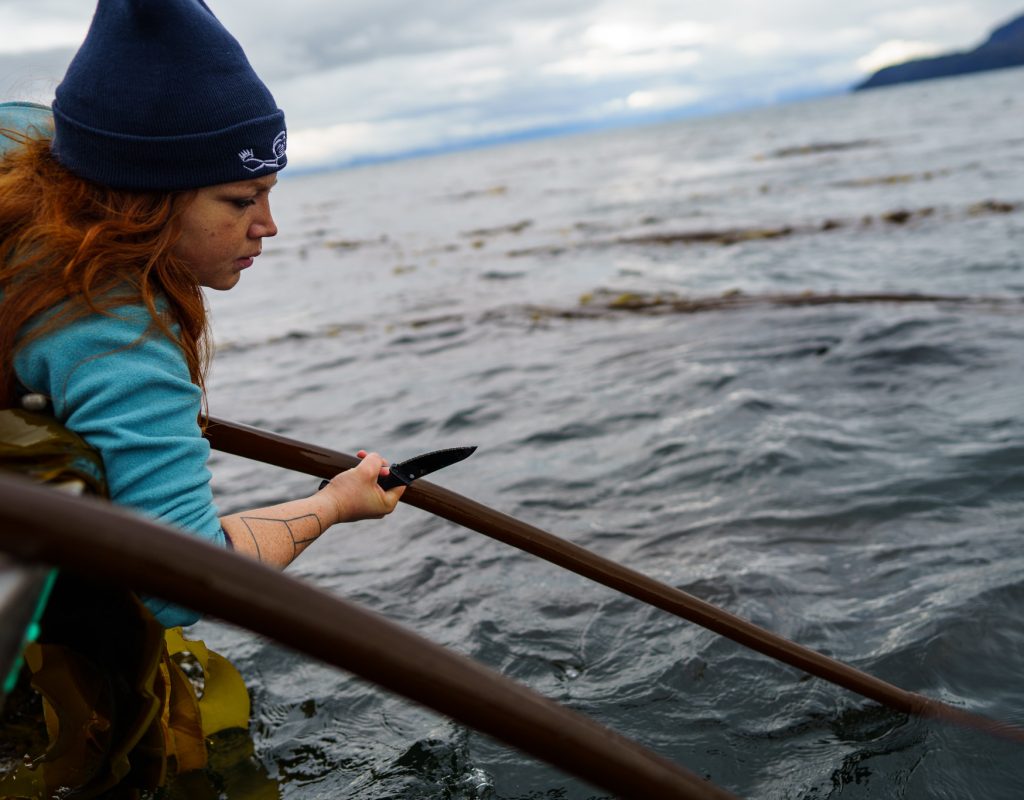
Southeast Alaska Regional Food Systems Catalyst
Sgaahl Siid Xyáahl Jaad, Marina Anderson. Photo by Bethany Sonsini Goodrich
Sg̱aahl Siid Xyáahl Jaad, Marina Anderson, is a 2023 Indigenous Leadership Awardee and emerging leader being honored for her dedication to Haida and Lingít culture and her leadership to uplift Southeast Alaska Native communities and protection of the Tongass rainforest.
The largest temperate rainforest in the world is a homeland unlike anywhere left on earth. Ancient trees stand guard over the dappled understory teeming with berry bushes and deer, moss-covered nurse logs nurture seedlings of the next generation, and bears go fishing by crystal-clear salmon spawning streams that flow out to the ocean. These majestic lands and waters are the ancestral and unceded territory of the Lingít, Haida, and Tsimshian peoples who continue to care for, steward, and honor these homelands located in what is known today as Southeast Alaska. Within this territory is also the Tongass, the nation’s largest national forest, and the country’s third largest island, called Prince of Wales.
Sg̱aahl Siid Xyáahl Jaad (Marina Anderson) has lived her whole life within these immense surroundings that are full of culture and history.
Marina is a Haida and Lingít educator, and solutions-based strategist working at the intersections of cultural, social, economic, and environmental justice. Her Haida name is Sg̱aahl Siid Xyáahl Jaad, which translates to “Dancing Flicker Woman.” Her Haida Clan is G̱aw Kiiwas (Raven/Owl/Flicker/Killer Whale/Grizzly Bear) from Massett Inlet and Howkan, and her Lingít clan is Taakw.aaneidí (Raven/Sculpin) from Heinya Kwaan.

An aerial view of Prince of Wales island. Courtesy of Sustainable Southeast Partnership
Growing up, Marina learned to harvest and process food from the ocean and forests alongside her parents James and Forest Anderson, her grandmother, and many uncles, aunts, cousins, and relatives. As a child, Marina remembers running down the beach, eating everything in sight and dreaming about what it must have been like to live in a different century, before the colonial era and the colonizers arrived. “I heard stories of how people used to live in these houses, traveling in canoes, and I imagined how living together sounds so beautiful. These were my vibrant four-year-old thoughts, appreciating and loving my family and everything that we had.”
Despite growing up as an Alaska Native child in the remote forest communities on Prince of Wales Island, her love of culture was not reflected by the education she received at school. Access to cultural knowledge was limited. “All these things were in danger because of contact and colonization,” she pointed out. “But I knew it was core to who we are, so I immersed myself as much as I could in our culture.”
“
—Marina Anderson
Her first professors of culture were the land and the many people who taught her life skills and values, including humility, being prepared, courage to learn and fail, and perseverance to keep trying because failure means people go hungry. She also learned what it means to show up with respect. “We’re part of the ecosystem that we love. Anything that I do is going to affect the surrounding environment.”
She looked for anyone who could teach her language and skills like weaving, sewing furs, tanning leather, and working respectfully with plants. “It wasn’t so I could become, like, ‘super Native’ or anything, but so that I had that knowledge to share with the next generations. That’s how our ancestors operated, always pulling the previous generations into the space. Everything they did was for the next generations.”
As a teen, Marina observed how other youth seemed impatient and eager to leave the island. While she was also interested in seeing other places, she knew she never wanted to leave her homeland. “I wanted to work for my people and work for this place that raised me.” Some of her most cherished life lessons were from her father while working on fish at their smokehouse. “He said, ‘You know, being Haida and Lingít is not about the things that you do. Being Haida and Lingít is about the way that you do things.’” She understood this to mean that holding onto her values as she went through life would make navigating some of these hard choices a little easier.
“They’re not just my values, my dad’s values, my grandmother’s values. These are our values. Collectively, these are the values of this place,” she stresses. “And it’s not just us as Indigenous people that have a responsibility to carry those values forward. It’s everybody that’s living in this place, whether they’re Native or non-Native. Those values should very well be part of the way that everybody is navigating through the world and navigating these choices that are laid out before us.”


Described by her mentors as a “young, energetic, culturally-trained superstar” and an exemplary servant-leader, this stage of her life has been marked by a non-stop whirlwind of advocating, strengthening, and advancing Indigenous economic opportunities while protecting Indigenous lands and waters and revitalizing language and culture.
Prior to and during the challenges of COVID-19 pandemic, Marina diligently served her community as the tribal administrator for the Organized Village of Kasaan while also tirelessly working with a diverse network of advocates in support of the 2001 Roadless Rule protections for the Tongass National Forest. In addition to serving on 11 tribal and community boards, she is the director of the Sustainable Southeast Partnership, a collective impact network that includes international, regional and community-based organizations, tribal governments, land managers, entrepreneurs, Native corporations, passionate individuals, and specialists in food sovereignty, land management, local business, energy systems, and storytelling. The network is Indigenous-led and driven by shared values and mission that elevate and prioritize people and place in visioning a thriving future.
“I spent a lot of time in the boardroom, underneath the table or sitting at the table, doing my homework and listening to these different meetings that were going on,” she recalls of her elementary school years. “I heard my parents and other adults having conversations about what you would call politics, but at the time, I just knew it as things that were affecting our people and our way of life.” She continues, “Listening to them talk about things like testifying to protect our black seaweed or the importance of putting land into trust, little did I know I was absorbing a lot of information at the time.” Following in the footsteps of her parents was a natural path for her in being an advocate for her people and her homeland.
In reflecting on her journey, Marina expresses gratitude for other leaders who laid the foundation for what she does now, and for all who guided her way and who accompany her now. “I think the way that I show up to work is a reflection of people investing time in me and the opportunity to be in these spaces.”
“When we look at a leader, it’s everybody that’s around them that’s supporting them, giving them ideas, and helping them behind the scenes. It’s the community that’s coming together to be the solution.” With a laugh she says, “My voice may be the loudest in the room and my hair might be really bright, but it’s everybody contributing that gets us to this point. It’s a compilation of all the work that happens around me that I get to be a part of.”

Marina Anderson harvesting bull kelp in Icy Strait during Haa Tóo Yéi Yatee Hoonah Culture Camp in 2022. Bethany Sonsini Goodrich
When she is not working, Marina can be found out on the land and water, harvesting and preserving traditional medicines and foods to share with her community, carving, weaving, beading, fur and skin sewing, and teaching younger community members so that they will have the knowledge and skills to navigate a complex world and do the same for those who come after them. Once a young girl learning from those who came before her, “Aunty Marina” now embodies that role and channels the wisdom of her ancestors in cultivating leaders of the future.
“You have choices that you make every single day. And when you’re younger, those choices seem harder. If you’re a 15-year-old kid in high school, you have to choose between going fishing with your dad and learning how to fish, or playing basketball and socializing with people your own age. … Do I go to college or stay at home and learn how to help provide for my family and the community? Do I spend my money at the mall on new Nike shoes? Or do I hold on to that money and put it towards jars for a potlatch?”
“You know, the leaders that are coming after us, most of them are already here, waiting right now,” she says. “I pull a lot of strength from the future generations, knowing what we’re giving them is a little bit better than yesterday because of the work that we’re putting in today. We have no idea what’s coming down the road years from now. All we can do is prepare everything for when it’s their turn to take that forward.”
Marina Anderson shares remarks and reflections during the 2023 Indigenous Leadership Award celebration.